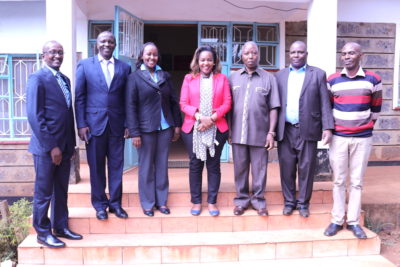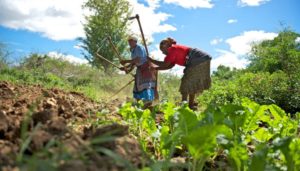- Have any questions?
- +254 718 619298
- thinking@developlocal.org

Perspectives on Open Data: Ethiopia
26th August 2019While there are instances where food production has recorded an increase [Abate, et al., 2015] factors that transformed maize productivity in Ethiopia, Africa’s food production has not grown significantly in the last 20 years. Where gains are recorded, the increase can be credited to an increase in area under cultivation [https://orcid.org/0000-0002-0652-3828], which in many parts of the continent is not a factor smallholder farmers can leverage on. Even then, this growth faces existential risks posed by conflict and climate change. Although additional gains in productivity could come from unlocking more arable land for agriculture or innovation in the upstream parts of commodity value chains, the primary contributor for smallholder farmers in sub-Sahara Africa will be yield increases. In order to do a greater job at closing the yield gap that exists between Africa and the rest of the global south, the continent needs to do a lot better.
While agricultural transformation remains a key goal for African countries, especially those in sub-Sahara Africa, moving towards manufacturing and services underpinned by growth in Agriculture requires innovation, investment and political will. However, upstream innovation in commodity value chains fall apart at the beginning; farm production. If no raw commodities get to the aggregators, transporters, processors and eventually retail outlets and at a competitive cost, there’s nothing to add value to and no pathway towards growth and transformation.
Increasing yields would require that a number of factors are addressed, some of which have historically seemed intractable. These range from rainfall, secure land tenure, protection of land rights, access to credit, access to affordable insurance, access to affordable and appropriate inputs and access to timely information on relevant good agronomic practices. While some of these can only be addressed through macro-level changes to legislative frameworks such as land tenure, some such as information on good agronomic practices, appropriate inputs and mitigation against reducing rainfall can be addressed through interventions that target smallholder farmers directly. The most effective delivery mechanism for evidence to aid farmers in decision-making remains extension services delivered by trusted local partners either as part of state institutions or the private sector.
Unfortunately, extension services presently have struggled to attract increased funding from governments and anecdotally also struggled to attract young talent. Consequently, the sector across Africa is characterized by shrinking public sector investments and an ageing workforce. This double whammy has left public sector extension services in many countries unable to serve the needs of smallholder farmers with extensionist-to-farmer ratios well beyond the 1:700 recommended level.
The Extension Support Program
The Evidence-Informed Decision Making (EIDM) Practice at LDRI has launched an Extension Support Program to contribute to efforts that address these issues. The program’s main focus is to help countries address, through practical evidence-informed actions, the enabling environment, human capital and sustainable financing aspects of extension services. ESP projects address challenges that affect the availability of evidence for decision making at the farm level for smallholder farmers to determine what crops, inputs and methods to adopt in order to achieve food security and profitability. The projects also address challenges affecting the availability of evidence for decision making by policy actors in order to address emerging challenges, the progress of plans/strategies and areas which require policy changes or interventions. Lastly, by taking a private-sector approach that empowers farmer-to-farmer government-supported extension, the pressure is reduced on already shrinking resources without adversely affecting service delivery all the while improving the reach of the current workforce.
The VBA Project
The combined challenge of access to information on better technologies, the addressing factors affecting the adoption of these technologies by smallholder farmers and the poor ratio of extensionists to farmers is being addressed through our Village Based Advisors Project. There have been numerous efforts geared towards encouraging smallholder farmers to adopt newer, better yielding inputs. However, many of those efforts did not adequately address the peculiar preferences [https://doi.org/10.1186/s40066-017-0108-6] or the risk averseness of smallholders and the factors that affect technology adoption before it makes the leap from early adopters to the early majority. The VBA Project is working with county governments and trusted local smallholder intermediaries to create a safe environment for experimentation by smallholders in order for them to generate the evidence they need to adopt new technologies. The VBA Project also supports the creation of an army of extension support volunteers (the Village Based Advisors or VBAs) who work with public sector extension officers at the grassroots to demonstrate to and educate smallholder farmers on new technologies and appropriate approaches for better yields.
Our aim within the ESP is to reach 1 million smallholder farmers with information on the right inputs, practices and extension services in order to double productivity in a select number of priority value chains by 2022. To this end, we are delighted by the efforts being made by the county governments of Kiambu and Embu in Kenya to adopt the VBA methodology and bring the approach to address the needs of more than 250,000 smallholder farmers by 2021.
The project is supported by Innovate Africa and funded by the Alliance for a Green Revolution in Africa (AGRA) through the Partnership for Inclusive Agricultural Transformation in Africa (PIATA).



